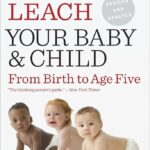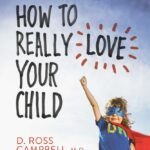There are hundreds of parenting books, helping struggling mums and dads to deal with children of different ages. Everyone will have their own ideas about which ones are most valuable. As a starting point, here are the ones I have found most helpful over the years. They are all twenty or more years old, yet remain in print on both sides of the Atlantic.
For books specifically dealing with home education, look at my home education books page. The books listed on this page cover the topics of communication, discipline, and personalities. You can find many of them in your local bookshop, or can order them online, new or used, at one of the bookstores such as Amazon UK, or (second-hand only) from Abebooks UK. The pictures and links below are for Amazon UK.
Your Baby and Child by Penelope Leach

For basic child-care covering just about everything from preparing for the birth to age 5, Penelope Leach‘s ‘Your baby and child’ is excellent. An older edition of this was my manual when my children were small. I found myself dipping into it to read a few pages nearly every day.
I didn’t agree with every word; for example I don’t believe in leaving a small child to cry at night. But the list of medical symptoms and advice was invaluable. I particularly liked, too, a useful section with suggestions for activities, craft ideas etc.
I also liked the way that the book looks at babies and children at their different stages. It does not expect every child to be the same, or to develop the same skills. It’s flexible, too, about food, structure and discipline.
Most of all, I liked the encouragement to be myself, to trust my instincts, and to spend time with my baby.
How to Really Love your Child by Ross Campbell

Several of my favourite books about parenting are by Ross Campbell, an American Christian writer.
Rather than dealing with discipline as such, he looks at the reasons why some children behave in an anti-social manner. He talks about the ‘emotional tank’ which can become drained through serious problems such as neglect or bullying. It can also seem empty from lack of positive attention. He describes ways in which parents can start to listen to their children and spend time with them in positive ways.
‘How to really love your child’ is perhaps his best-known classic. He also wrote ‘How to really love your angry child’, which was originally called ‘Kids in Danger’. That focuses on children who seem to be in a temper all the time. If you have older children, his book ‘How to really love your teenager’ has similar ideas appropriate for this age-group.
Campbell wrote these books many years ago, but most remain in print in the UK and USA. They have recently been reprinted yet again in both countries – a testament to their success. If you only buy one book about parenting, I would recommend one by Ross Campbell.
Parenting books about general communication
An excellent book about sibling rivalry is ‘Siblings without rivalry’ by Adele Faber and Elaine Mazlish.
This book looks at reasons why brothers and sisters squabble. It suggests ways that parents can deal with this, often by encouraging the children to think in a new way about their differences.
These authors have also written ‘How to talk so kids will listen and listen so kids will talk.’ This book helps parents to stop and listen to what their children are actually trying to say, and to communicate without nagging. I found it extremely useful when my sons were about seven to ten, and it saved many big arguments.
For those with older children, the same authors have also written ‘How to talk so teens will listen and listen so teens will talk’. They have also written ‘How to talk so kids will learn’, primarily for teachers. But it is also relevant to education of any sort, including home education.
Parenting books about discipline
Most likely your child knows that you love him. You probably give him plenty of attention, too, particularly if you are home educating. But battles or behavioural problems can still cause stress in the family. If so, you might like to read one of Kevin Leman’s books.
‘Making children mind without losing yours’ is one of the best books on general discipline that I’ve ever read. The suggestions mostly work, too. The author bases his theory of ‘reality discipline’ on principles of motivation. He believes in teaching responsibility as the child grows up. However he stresses the importance of unconditional love and flexibility above everything.
My only slight problem with this author’s books is that his methods can become a bit manipulative or coercive, if used rigidly. I always preferred family discussion and hoped we could find solutions to problems that way.
Leman writes from a Christian perspective but the suggestions he makes could apply to anyone. Another of his books, ‘Bringing up kids without tearing them down’ is also excellent. It deals mostly with teenage problems. He gives a lot of anecdotes from his own family of five children, two of whom were at college when he wrote the book. His style is easy to read and often humorous.
Books about different personalities in children
My favourite book about different personalities in children is Nurture by Nature by Paul D Tieger and Barbara Barron-Tieger.
This book is based on the Myers-Briggs personality type indicator. It looks at how different children develop, and ways that parents can understand and help them. You can find further information about the Myers-Briggs theory in my article ‘Understanding Personality Types‘.
Since there are sixteen different personality types listed, you might think it rather a waste to buy this book if you have only one child, or two with similar personalities. But I find it a fascinating read. It may give insights into your own childhood, and can help you understand other children who are different from your own.
If you sometimes feel that your child is an alien, this is a great book to read.
Parenting books about family life
‘Families and how to survive them’ by Robin Skynner and John Cleese is a remarkable book. It puts current psychiatric practice and research into layman’s terms.
It’s written in a quirky style as dialogue between Cleese and his therapist, with a few touches of Cleese humour. It outlines the basic stages a child has to go through to reach adulthood with emotional health. I found the style slightly irritating when I began the book. But I was soon so encouraged and inspired by the insights that I no longer worried about it.
The sequel to this, ‘Life, and how to survive it’, is written in similar style. That looks more at what emotional health is and why we behave as we do. It examines religious behaviour from a non-Christian perspective, with some thought-provoking comments about some Biblical commandments and principles.
For children with mild learning difficulties
If your child has profound special needs, you will probably already have resources to help. However there are two books which other parents, particularly some home educators, have recommended to me. They are for children who don’t fit the mould; those for whom standard parenting methods make little difference.
The first is relevant if your child has poor attention span or seems hyperactive. It’s a helpful book that examines the whole spectrum of attention deficit disorder (ADD). ‘Right-brained Children in a Left-brained World’ by J Freed and L Parsons is powerful and inspiring.
There’s also an encouraging and positive book that deals with dyslexia and related disorders. It’s called ‘The gift of dyslexia’ by Ronald Davis. I have dipped into it, and thought it fascinating. Those who have read it, and who have dyslexic children, find it very helpful.
A book about ‘spirited’ children
And finally… if you think your child is over-active, or over-emotional, you might find this book helpful. ‘Raising your spirited child’ by Mary Sheedy Kurcinka is an excellent read. The book makes no criticism of parents or children. It acknowledges that there are excitable, busy, energetic children, and helps parents to understand them.
It does not deny the possible diagnosis of ‘hyperative’ or ‘ADHD’. But it suggests that many children who seem over-active may be bright, full of ideas, and creative. To limit them, or punish or drug them would, in many cases, be unhelpful. There is a revised edition of this book, although I have not read the updated version. I assume it expands on the earlier book, perhaps with new research or examples.
If you believe your child is unusual in any way, but don’t think he or she has anything seriously wrong, you might be interested in my article ‘Attention Deficit or Highly Spirited’.
Further reading on this site:
Raising bookworms
home education and gifted children
discipline
parenting theories
books about home education